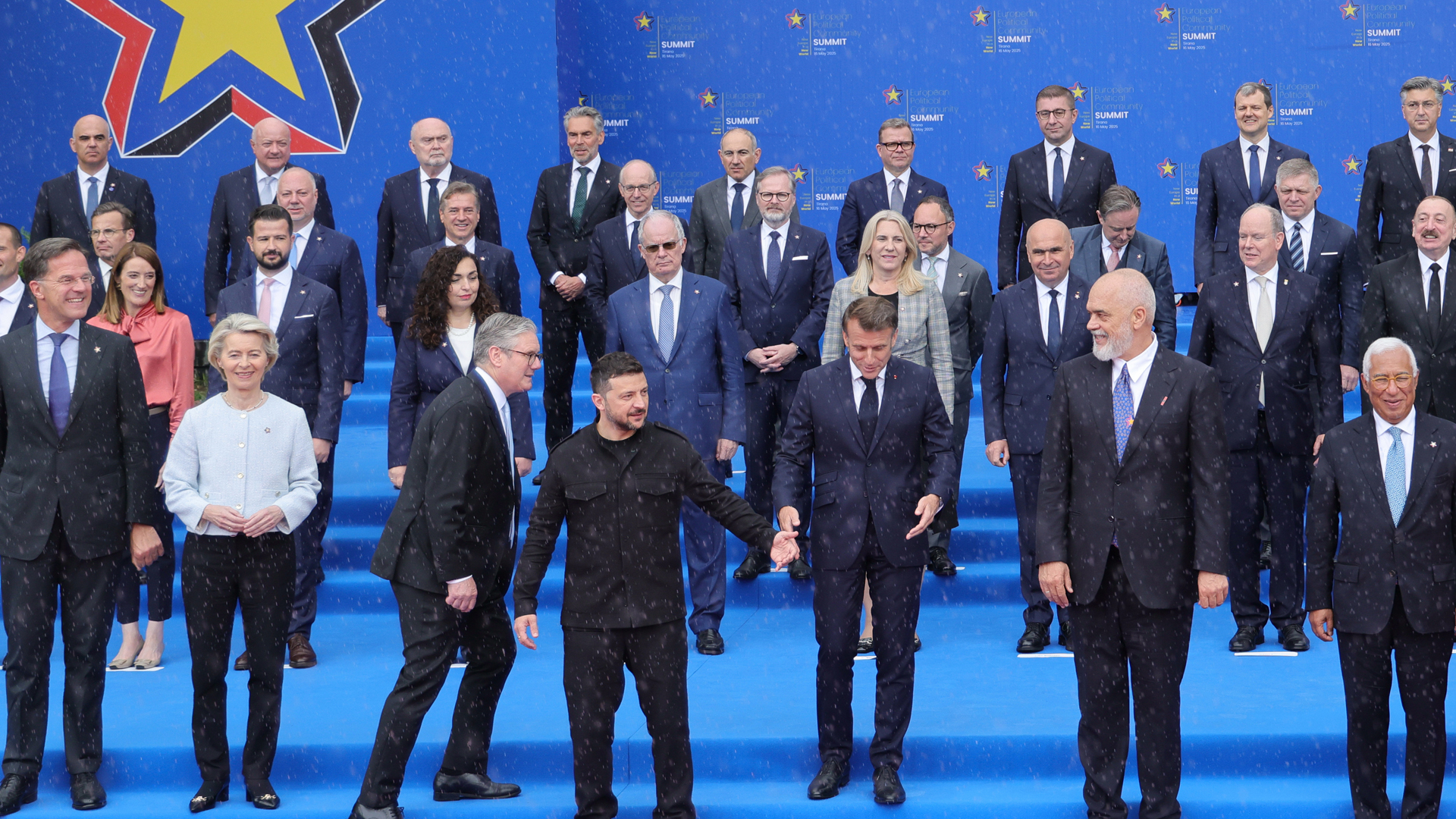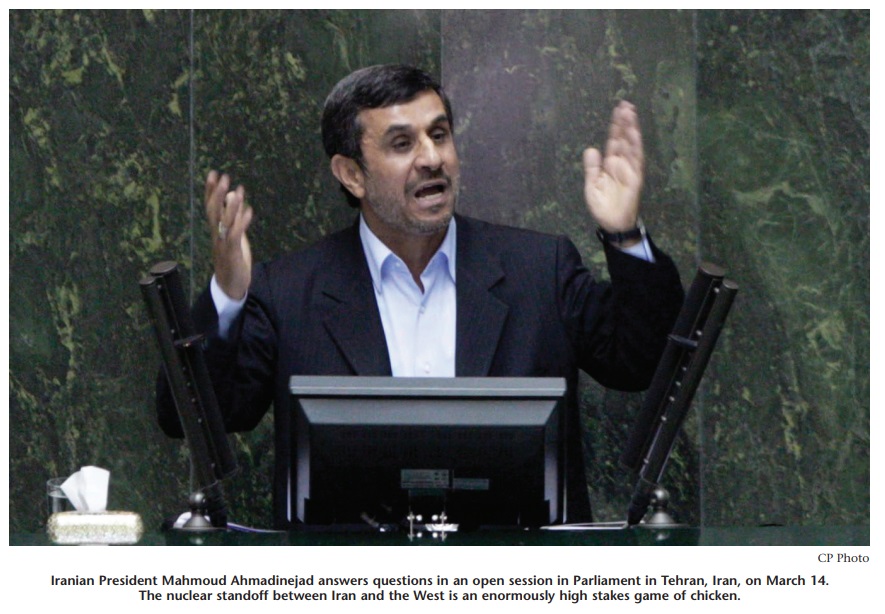
It’s a game of chicken. But don’t expect Iran to blink first in its growing nuclear standoff with Israel and the United States.
In the classic game of chicken, as conceived by Nobel laureate Thomas Schelling, two motorists are hurtling down the same road toward each other. How does one motorist force the other to swerve to avoid a head-on collision that will surely kill them both? Schelling famously observed that he should rip out his steering wheel and toss it out the window to show he has no other options.
Iran and Israel are on that road now. Iran’s leadership is on the ropes, and it is driving down the nuclear road recklessly and straight in the direction of an oncoming car, Israel, and the truck behind it, the United States.
There are a number of reasons for Iranian intransigence. Western sanctions are taking a real bite out of Iran’s oil-dependent economy as it scrambles to find other buyers in India, China and Pakistan. Iran’s regime is divided, and it fears the boomerang effect of the Arab Spring that has toppled authoritarian regimes throughout the region. Remember, the populist uprisings began in the streets of Tehran in 2009. They were ultimately suppressed in a brutal crackdown by Iran’s Revolutionary Guard and the other thugs who support President Mahmoud Ahmadinejad and the mullahs. Next time its leaders may not be so lucky, and they know it.
Iran’s only real friend in the region, President Bashir al-Assad of Syria, is surely not long for this world, or at least for government. Russia’s new president, Vladimir Putin, has signalled that Russia’s support for Assad is not unconditional. If the Sunni majority topples Assad’s minority Alawite regime (a Shiite sect), Iran’s regional power and influence will be greatly diminished.
The lesson that Iran’s leaders have surely drawn after the fall of Libya’s Moammar Gadhafi and Iraq’s Saddam Hussein is that had these leaders had nuclear weapons at their disposal they would still be in power. Like North Korea, the Iranian regime sees the nuclear option as the key to its survival. Each turn of the screw on sanctions simply reinforces its leaders’ deepest existential fears. That is why they are racing to process enough weapons-grade fissile material to build a bomb.
Israel’s existential dilemma is one of national survival as it hurtles down the same highway in the opposite direction. It fears a nuclear Iran because Iran’s leaders have rhetorically made no secret of the fact they seek Israel’s total annihilation. They have used Hezbollah and other proxies in the region to attack Israel and light fires on Israel’s borders.
Israeli leaders may have also drawn the lesson from their bombing raids on Iraqi and Syrian nuclear facilities that military force is the best way to stop an enemy from acquiring nuclear weapons.
On his recent visit, Prime Minister Benjamin Netanyahu pressed Ottawa and Washington to support an attack on Iran’s nuclear installations if Iran crosses the red line. Though the support Netanyahu got in both capitals was hedged by calls from his respective hosts for more diplomacy, he, too, is trying to signal that his hands are tied and his options are fast running out, although Israeli public opinion on attacking Iran is divided, and an Israeli attack would have dangerous consequences for Israel and would ignite a war that would be disastrous for the West.
Throughout this crisis, the message coming out of Washington has been a muddled one. By saying that “all options are on the table,” President Barack Obama is in effect signalling to Tehran and Jerusalem that he hasn’t thought through his options, or even worse still, he is committed to none.
The message coming out of Washington has been a muddled one. By saying that “all options are on the table,” President Barack Obama is in effect signalling to Tehran and Jerusalem that he hasn’t thought through his options, or even worse still, he is committed to none.
The chairman of the US Joint Chiefs of Staff, Martin Dempsey, publicly counselled against a military attack on Iran on the grounds that its leaders are “rational” and know the consequences of their actions. President Obama said differently in an interview that was published recently in the Atlantic magazine. Leaving the military option against Iran on the table, he further opined: “I think that the Israeli government recognizes that, as president of the United States, I don’t bluff,” adding, “I also don’t, as a matter of sound policy, go around advertising exactly what our intentions are. But I think both the Iranian and the Israeli governments recognize that when the United States says it is unacceptable for Iran to have a nuclear weapon, we mean what we say.”
In a speech he gave to the American Israel Public Affairs Committee the day before he welcomed Prime Minister Netanyahu to the White House, the President said, “Iran’s leaders should understand that I do not have a policy of containment, I have a policy to prevent Iran from obtaining a nuclear weapon.”
It is not at all clear what President Obama’s policy of prevention is. To say you’re not bluffing also implies you have conveyed a clear threat. Obama has threatened nothing in his remonstrations about the “unacceptable.” This is not the way to conduct effective coercive diplomacy or to send a clear and unequivocal message to Tehran, especially at a time when America to much of the world looks weak and tattered. In times of crisis, it also vital that the president and his generals sing from the same song sheet by conveying one message, not two or three.
Some say that the administration is woolly about the strike option in order to keep a putative Israeli strike in the air without engaging in such a move itself. That is too clever by half and only incites Iran’s hardliners and speed in their nuclear processing.
There may come a time when positive inducements and reassurances need to be the tone to assuage Iran’s deepest fears. But Obama has to get the sequence right: focused tough talk backed by warnings of action comes first, with appropriate assurance that it is the nuclear weapons alone that are the subject; concessions come second and only after Tehran has signalled clearly and unequivocally it is ready to accept the requirements and negotiate. The threat also has to indicate that when the original demands are met rewards would be available. The stick first, then there will be a carrot.
No president understood this better than John F. Kennedy.
Fifty years ago Kennedy faced the biggest crisis since the Second World War, one that has real lessons for the crisis the world faces today with Iran, despite some key differences. The strategic choices under consideration are similar — whether to use force or not and how to secure a negotiated resolution in order to avert war.
On October 14, 1962, following a botched American attempt to land at the Bay of Pigs to overthrow the Communist regime of Fidel Castro in April 1961, Kennedy received word that the Soviets were deploying nuclear-armed, offensive missiles on Cuban soil. Within weeks, the Soviets would be able to attack America’s cities and military bases without warning. America would become Russia’s hostage or worse unless the president acted fast and decisively.
In the days that followed, President Kennedy met with his advisers in the White House to consider his options. His top general, Curtis LeMay, head of the US Strategic Air Command, and others argued emphatically that America should take swift and decisive military action. A knock-out punch by US air power would eliminate the threat and send a powerful message that the United States was not about to give in to the Soviet Union. But some of the president’s other advisers, including Secretary of Defense Robert McNamara, were not so sure. They worried that a preemptive strike against Soviet missile installations in Cuba could lead to World War III and nuclear Armageddon if the Soviets decided to retaliate. At the very least, the Soviets might be emboldened to seize West Berlin, a British, French and American enclave deep inside East Germany behind the Iron Curtain.
From October 16 to October 22, 1962, President Kennedy and his closest advisers thrashed out, in secret, the problem of how to deal with the missiles. During those deliberations, six basic options were put on the table: (1) do nothing; (2) diplomatic pressure; (3) a secret approach to Cuban leader Fidel Castro; (4) invasion; (5) a surgical air strike; and (6) a naval blockade. Ultimately, Kennedy chose a mixed approach of blockade and diplomacy, negotiated within those limits, and achieved his goals and avoided war.
On Monday, October 22, the president went on national television to break the news to the world and announce the immediate imposition of a naval “quarantine,” to prevent the shipment of missiles to Cuba and pressure the Soviets to remove the ones already installed. At the same time, he launched a vigorous diplomatic offensive to deal with the crisis. He secured the formal support of the Americas’ hemispheric organization, the Organization of American States (OAS), and then of the United Nations. He opened negotiating channels to probe Soviet intentions and show how their actions threatened their own vital interests. Working against the clock, he drew a proposal from Soviet premier Nikita Khrushchev, and under the pressure of time the two were rapidly able to strike a face-saving agreement: the Soviets agreed to withdraw their missiles and nuclear warheads from Cuba in exchange for a US promise not to invade Cuba, and a side deal sweetener on the removal of US nuclear-armed Jupiter missiles from Turkey (already decided by the United States). Kennedy then praised Khrushchev for having avoided war. President Kennedy’s superior negotiating skills clearly won the day, defusing a major crisis that could have become World War III.
It is worth stopping a moment here to consider the elements of the joint diplomatic victory. Each side gave diplomacy its “best effort” by being prepared to give something in order to get something to defuse the crisis. Coercive diplomacy or tough talk was complemented by reassurance and positive inducements, or sweet talk.
However, President Kennedy offered inducements to the Soviets only after he had limited Soviet options through the naval blockade, making it clear as the sea to Khrushchev that his actions would lead to war if he did not comply with US demands. When he did, he was rewarded in terms of his own interests.
What is also important to note is that there was deep presidential engagement in these negotiations and a serious personal commitment to exploring with the Soviets what was possible and acceptable to both sides. Kennedy ruled out a direct attack on the Soviet missile installations in Cuba, a move that would surely have provoked World War III. As we now know, the Soviets had already deployed some of their nuclear warheads in Cuba and Castro himself was ready to seize the missiles himself and fire them if a US attack appeared imminent. We were a lot closer to the brink than even Kennedy and his advisers believed they were. (During the crisis, Kennedy opined that the odds of nuclear war were 1 out of 3.)
Kennedy also worked the clock to his advantage. He had a finite bargaining period, a clear deadline and a threat to resort to arms in the absence of a satisfactory response. International legitimacy for firm action was obtained through the support of international organizations, both regional and global. And, as a coda, the side that gained more thanked and congratulated the other.
There are military options short of war to ratchet up the pressure on Tehran so that it comes clean and eschews its own “nuclear option.” They include further sanctions, a build-up of US naval assets in the Gulf and Arabian Sea, a naval blockade on Iran’s ports and perhaps even the imposition of a no-fly zone over Iranian airspace (though it would likely have to be done by a Coalition of the Willing without Security Council approval, because Russia and China would oppose such action). Joint military exercises with Israel or with other regional allies who are worried about Iran’s nuclear intentions, especially Saudi Arabia, Turkey, and the Gulf States, may also be needed to send Iran a strong message that the US isn’t bluffing.
Fifty years ago Kennedy faced the biggest crisis since the Second World War, one that has real lessons for the crisis the world faces today with Iran, despite some key differences. The strategic choices under consideration are similar — whether to use force or not and how to secure a negotiated resolution in order to avert war.
The prime element of this crisis management exercise is not merely the use of tough talk and coercive diplomacy, however. It must focus on policy and not on regime change, an existential fear under which Iran’s mullahs operate as they look westwards to the fate of their key ally in the region, Syria’s leader Bashir al-Assad as well as other leaders in the region who have fallen with Western approval. Iran’s leaders face major opposition internally. Israel and the United States are useful bogeymen to bolster their own internal political support and rally their people behind them.
In a democratic age, authoritarian leaders and despots will always be plagued by existential fears and doubts about their long-term political survival. The Arab Spring has only served to reinforce such fears in Tehran. So too has US policy, which, under successive administrations, has made the global advancement of democracy a key foreign policy goal.
Generically, this emphasis on democracy and democratic development conveys the idea that regime change is one of America’s basic goals. However, it is also true that no matter how unsavoury Iran’s leaders happen to be, they thus need to be convinced that the West’s desire to seek policy change regarding Iran’s nuclear intentions is not the same as regime change. Actually, it is easier to achieve policy change when it is made clear to Iran’s leaders that regime overthrow is not the US or the West’s aim, regardless of broader foreign policy ambitions.
It is important to go further and indicate to the Iranians that there is a Western awareness of their historical importance and a respect for the civilizational role of their country. We need only remind ourselves (but not the Iranians) that it was that importance that made the West support the Shah. The regime sees the US as the source of a great satanic threat to their existence; the US and allies need to “unexistentionalize” their demands. As Assistant Secretary Christopher Hill said of the six-party talks in Asia, “What we are trying to do is to show North Korea that there is a better way to achieve security than excessive armament, that that is to join the security arrangements of the international community.” The same message needs to be sent to Iran, with respect for its stature from the past and available in its future.
It’s all about clarity and effectiveness. Because there is a deadline, even if it is not as clear or probably as immediate as the Cuban one. And it is not the deadline of elections, which seems to have spurred Washington into belated and uncertain action. The world is heading toward a bad war or a worse peace if clear messages are not sent to Tehran that its regime’s actions are more threatening to its existence than the policy changes the international community requires.
There is also a need, above all, to keep on talking, to keep a talking line open, to discern any tiny changes in Iran’s policies and politics, to set up a foil for an alternative secret back channel used so often, to seize the high moral ground and to show how we are holding firm. The clear word of a stick, with carrot leaves, is needed.
Photo: Shutterstock








